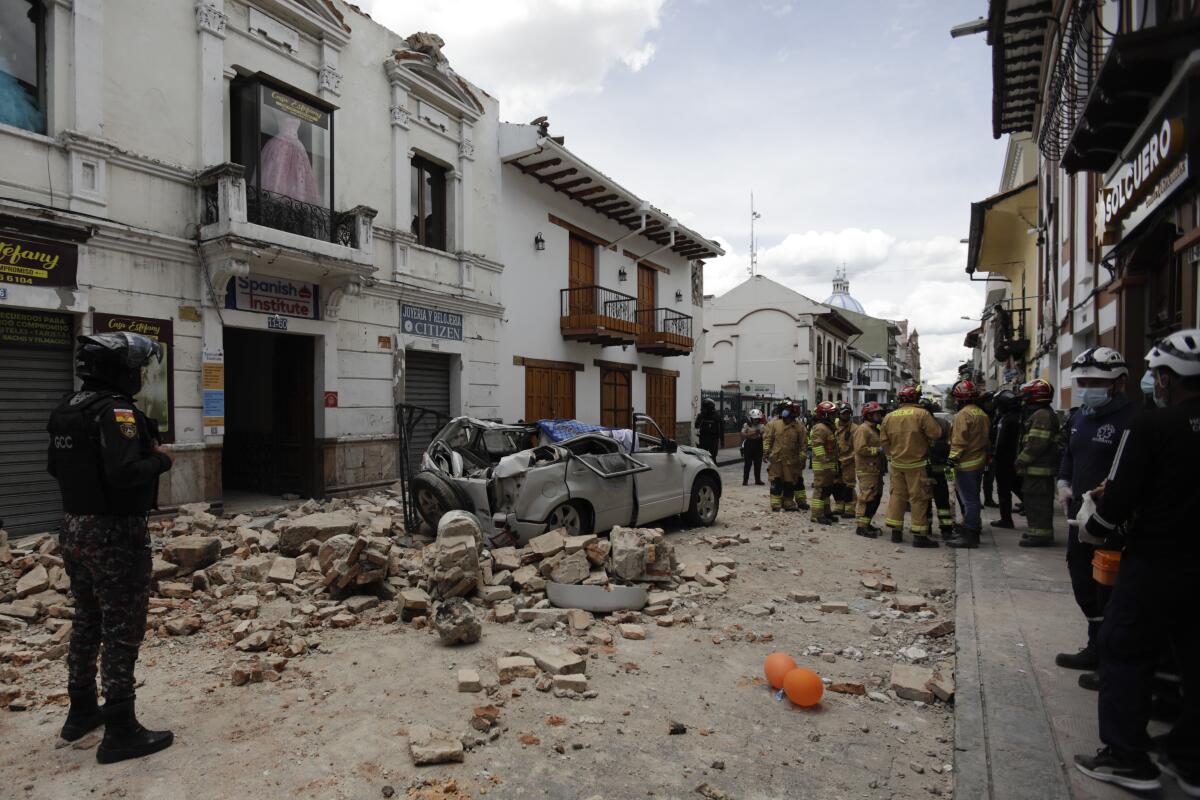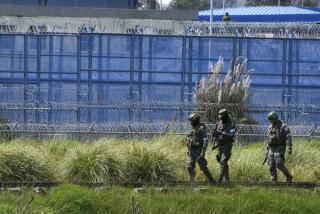Earthquake kills at least 14 in Ecuador, 1 in Peru, and causes widespread damage

- Share via
QUITO, Ecuador — A strong earthquake shook southern Ecuador and northern Peru on Saturday, killing at least 15 people, trapping others under rubble and sending rescue teams into streets littered with debris and fallen power lines.
The U.S. Geological Survey reported an earthquake with a magnitude of 6.8 in the country’s coastal Guayas region. It was centered about 50 miles south of Guayaquil, Ecuador’s second-largest city. One of the victims died in Peru, while 14 others died in Ecuador, where authorities also reported that at least 126 people were injured.
Ecuadorean President Guillermo Lasso told reporters the earthquake had “without a doubt ... generated alarm in the population.” Meanwhile, Ecuador’s Risk Management Secretary Cristian Torres in a radio interview said 11 of the victims died in the coastal state of El Oro and one in the highlands state of Azuay.
In Peru, the earthquake was felt from its northern border with Ecuador to the central Pacific coast. Peruvian Prime Minister Alberto Otárola said a 4-year-old girl died from head trauma she suffered in the collapse of her home in the Tumbes region, on the border with Ecuador.
One victim in Azuay was a passenger in a vehicle crushed by rubble from a house in the Andean community of Cuenca, according to the Risk Management Secretariat, Ecuador’s emergency response agency.
In El Oro, several people were trapped under rubble, the agency reported. In the community of Machala, a two-story home collapsed before people could evacuate, a pier gave way and a building’s walls cracked, trapping an unknown number of people.
The agency said firefighters worked to rescue people while the national police assessed damage, their work made more difficult by downed lines that interrupted telephone and electricity service.
Machala resident Fabricio Cruz said he was in his third-floor apartment when he felt a strong tremor and saw his television hit the ground. He immediately headed out.
“I heard how my neighbors were shouting and there was a lot of noise,” said Cruz, a 34-year-old photographer, adding that he noticed the collapsed roofs of nearby houses.
Ecuador’s government also reported damage to healthcare centers and schools. Lasso said he would travel on Saturday to El Oro.
In Guayaquil, about 170 miles southwest of the capital, Quito, authorities reported cracks in buildings and homes, as well as some collapsed walls. Authorities ordered the closure of three vehicular tunnels in Guayaquil, which anchors a metro area of more than 3 million people.
Videos shared on social media show people gathered on the streets of Guayaquil and nearby communities. People reported objects falling inside their homes.
One video posted online showed three anchors of a TV show dart from their studio desk as the set shook. They initially tried to shake it off as a minor quake but soon fled off camera. One anchor indicated the show would go on a commercial break, while another repeated, “My God, my God.”
Luis Tomalá was fishing with others when the earthquake struck. He said their boat began moving “like a racehorse, we got scared, and when we turned on the radio, we heard about the earthquake.” That’s when his group, Tomalá said, decided to stay at sea, fearing a tsunami could develop.
A report from Ecuador’s Adverse Events Monitoring Directorate ruled out a tsunami threat.
Peruvian authorities said the old walls of an army barracks collapsed in Tumbes.
Ecuador is particularly prone to earthquakes. In 2016, a quake centered farther north on the Pacific coast in a more sparsely populated area of the country killed more than 600 people.
Machala student Katherine Cruz said her home shook so badly that she could not even get up to leave her room and flee to the street.
“It was horrible. I had never felt anything like this in my life,” she said.
More to Read
Sign up for Essential California
The most important California stories and recommendations in your inbox every morning.
You may occasionally receive promotional content from the Los Angeles Times.










